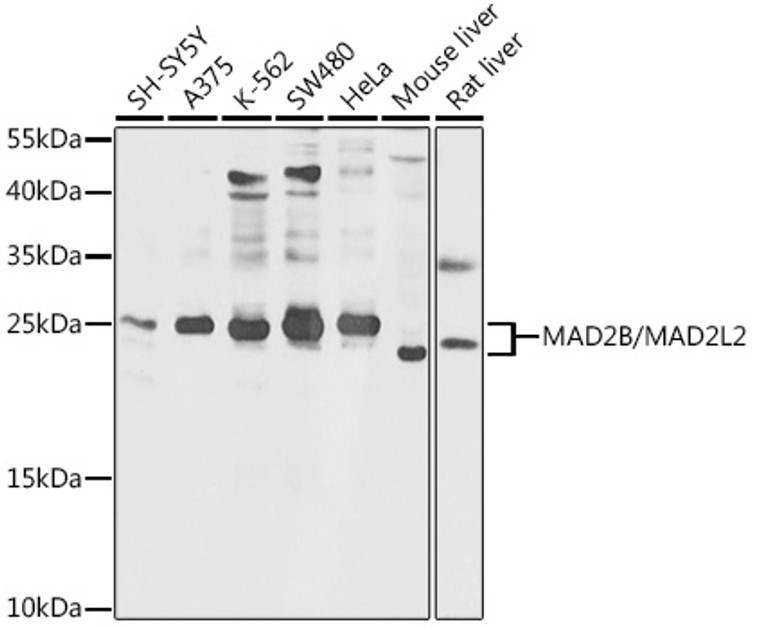| Host: |
Rabbit |
| Applications: |
WB/IF |
| Reactivity: |
Human/Mouse/Rat |
| Note: |
STRICTLY FOR FURTHER SCIENTIFIC RESEARCH USE ONLY (RUO). MUST NOT TO BE USED IN DIAGNOSTIC OR THERAPEUTIC APPLICATIONS. |
| Short Description: |
Rabbit polyclonal antibody anti-MAD2L2 (1-211) is suitable for use in Western Blot and Immunofluorescence research applications. |
| Clonality: |
Polyclonal |
| Conjugation: |
Unconjugated |
| Isotype: |
IgG |
| Formulation: |
PBS with 0.02% Sodium Azide, 50% Glycerol, pH7.3. |
| Purification: |
Affinity purification |
| Dilution Range: |
WB 1:500-1:2000IF/ICC 1:50-1:200 |
| Storage Instruction: |
Store at-20°C for up to 1 year from the date of receipt, and avoid repeat freeze-thaw cycles. |
| Gene Symbol: |
MAD2L2 |
| Gene ID: |
10459 |
| Uniprot ID: |
MD2L2_HUMAN |
| Immunogen Region: |
1-211 |
| Immunogen: |
Recombinant fusion protein containing a sequence corresponding to amino acids 1-211 of human MAD2B/MAD2B/MAD2L2 (NP_006332.3). |
| Immunogen Sequence: |
MTTLTRQDLNFGQVVADVLC EFLEVAVHLILYVREVYPVG IFQKRKKYNVPVQMSCHPEL NQYIQDTLHCVKPLLEKNDV EKVVVVILDKEHRPVEKFVF EITQPPLLSISSDSLLSHVE QLLRAFILKISVCDAVLDHN PPGCTFTVLVHTREAATRNM EKIQVIKDFPWILADEQDVH MHDPRLIPLKTMTSDILKMQ LYVEERAHKGS |
| Tissue Specificity | Ubiquitously expressed. |
| Function | Adapter protein able to interact with different proteins and involved in different biological processes. Mediates the interaction between the error-prone DNA polymerase zeta catalytic subunit REV3L and the inserter polymerase REV1, thereby mediating the second polymerase switching in translesion DNA synthesis. Translesion DNA synthesis releases the replication blockade of replicative polymerases, stalled in presence of DNA lesions. Component of the shieldin complex, which plays an important role in repair of DNA double-stranded breaks (DSBs). During G1 and S phase of the cell cycle, the complex functions downstream of TP53BP1 to promote non-homologous end joining (NHEJ) and suppress DNA end resection. Mediates various NHEJ-dependent processes including immunoglobulin class-switch recombination, and fusion of unprotected telomeres. May also regulate another aspect of cellular response to DNA damage through regulation of the JNK-mediated phosphorylation and activation of the transcriptional activator ELK1. Inhibits the FZR1- and probably CDC20-mediated activation of the anaphase promoting complex APC thereby regulating progression through the cell cycle. Regulates TCF7L2-mediated gene transcription and may play a role in epithelial-mesenchymal transdifferentiation. |
| Protein Name | Mitotic Spindle Assembly Checkpoint Protein Mad2bMitotic Arrest Deficient 2-Like Protein 2Mad2-Like Protein 2Rev7 HomologHrev7 |
| Database Links | Reactome: R-HSA-110312Reactome: R-HSA-5655862Reactome: R-HSA-5656121 |
| Cellular Localisation | NucleusCytoplasmCytoskeletonSpindleChromosomeRecruited To Sites Of Chromosomal Double-Stranded Breaks During G1 And S Phase Of The Cell Cycle |
| Alternative Antibody Names | Anti-Mitotic Spindle Assembly Checkpoint Protein Mad2b antibodyAnti-Mitotic Arrest Deficient 2-Like Protein 2 antibodyAnti-Mad2-Like Protein 2 antibodyAnti-Rev7 Homolog antibodyAnti-Hrev7 antibodyAnti-MAD2L2 antibodyAnti-MAD2B antibodyAnti-REV7 antibody |
Information sourced from Uniprot.org
12 months for antibodies. 6 months for ELISA Kits. Please see website T&Cs for further guidance










